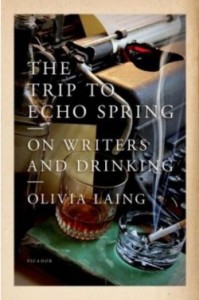January 13, 2014
Writing drunk: Olivia Laing finds links between writing and drinking
by Emma Aylor

The American cover of Laing’s book.
We’ve all heard Hemingway’s “Write drunk; edit sober,” and Baudelaire’s “One should always be drunk.” We’ve imagined our favorite writers at typewriters with highballs or with rings of wine on their notebook pages. We know that Plath, scotch-drunk, bit Ted Hughes’ cheek. As The Awl’s David Burr Gerrard writes in his recent interview with Olivia Laing, author of The Trip to Echo Spring: On Writers and Drinking, “It’s difficult not to romanticize a link between writing and drinking.”
Though the two are clearly linked, it’s always been unclear exactly how, as Gerrard explains.
Wisdom hurts, so the more wisdom a writer has, the harder the writer will try to drown it with alcohol. Or maybe it isn’t wisdom that needs to be drowned; it’s the inner editor. Or maybe the great passion that leads to great writing also leads to great drinking. Or maybe . . . anyway, there must be some connection, so can we please put down our horrible manuscripts and pour ourselves some bourbon already?
By Gerrard’s measure of The Trip to Echo Spring, Laing encompasses all of these: the self-consciousness, self-censorship, passion. Her book focuses both on her own family history and on the drinking lives of Hemingway, Fitzgerald, Tennessee Williams, Cheever, Berryman, and Carver, all these drinking men.
Women drinking, Laing explains in the interview, would be too close to the bone by her own history; in addition, the particular narrative of male writers’ drinking compelled her:
. . . it’s a very different story with women. Like with Jean Rhys, who I think is really interesting. To her contemporaries and in retrospect, that looks like a really sad life in a way that I don’t think we think of Hemingway’s life as a sad life. . . . There’s sort of a bro-ishness about it, whereas women don’t get that.
Particularly by the surplus of “bro-ishness” surrounding the subjects she writes on, a clean and fond empathy was central to Laing’s project.
It had to be writers that I loved. I think there’s a real tendency in dealing with this kind of material to be sort of trashy about it or sleazy or to take pleasure in seeing them throwing up. I really didn’t want to do that. You can get a very spiteful tone if there are people whose writing you don’t appreciate.
Her empathy, however, does not seem to have dulled her observations. She speaks sharply about the personality of alcoholism she witnessed in writing the trajectories of her subjects’ lives:
These guys weren’t heavy drinkers: they were alcoholics. That’s a very specific thing, an entire personality structure. Whoever you were before, it takes you over. So you can watch them becoming these almost vampiric figures. I don’t want to overdramatize it, but it’s possible to see that alcoholic personality emerging in all of them. Like Berryman phoning up his students in the middle of the night and threatening to kill them. He had been such a decent, ethical teacher, he took teaching so seriously; that’s not the person he was, yet that’s the person he became.
After all of her work, Laing has reached some sort of conclusion, if not a closure. “One of the things I came to think,” she said, “is that, certainly in these six, the desire to write and the need to drink came from a similar place.” It’s the human and the artist, twinned, in these men, that seems to have been the catalyst:
Berryman did a Paris Review interview just before he died. He says I want as much pain piled on me as possible. I want to be crucified, because that’s what makes for good art. So I think there are these two divergent tendencies. One of them is: “bring it on, let me suffer so I can write about it,” and the other is a small boy saying “ow, this hurts, I want out, I can’t do it.” Totally contradictory impulses, coexisting in the same person.
Our fascination with authors who drink seems to stem from the same contradiction. What we want, what they wanted, is the space between the writer and the human—the interstice by which every component is one person, whole.
Emma Aylor is a former Melville House intern.